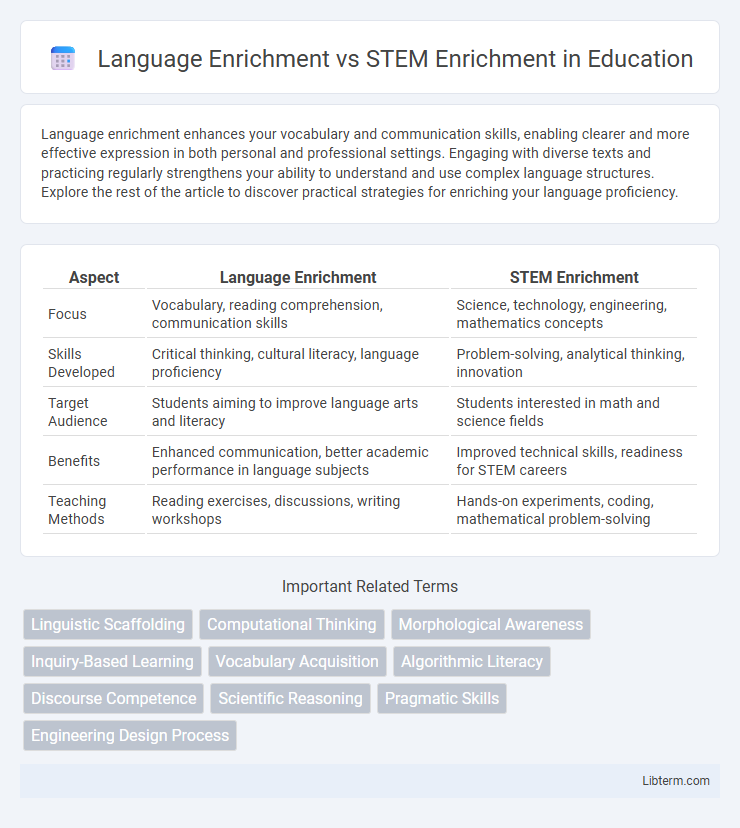Language enrichment enhances your vocabulary and communication skills, enabling clearer and more effective expression in both personal and professional settings. Engaging with diverse texts and practicing regularly strengthens your ability to understand and use complex language structures. Explore the rest of the article to discover practical strategies for enriching your language proficiency.
Table of Comparison
| Aspect | Language Enrichment | STEM Enrichment |
|---|---|---|
| Focus | Vocabulary, reading comprehension, communication skills | Science, technology, engineering, mathematics concepts |
| Skills Developed | Critical thinking, cultural literacy, language proficiency | Problem-solving, analytical thinking, innovation |
| Target Audience | Students aiming to improve language arts and literacy | Students interested in math and science fields |
| Benefits | Enhanced communication, better academic performance in language subjects | Improved technical skills, readiness for STEM careers |
| Teaching Methods | Reading exercises, discussions, writing workshops | Hands-on experiments, coding, mathematical problem-solving |
Introduction to Language and STEM Enrichment
Language enrichment enhances communication skills, vocabulary development, and cultural awareness through immersive reading, writing, and speaking activities. STEM enrichment focuses on fostering critical thinking, problem-solving, and innovation by engaging students in science, technology, engineering, and math projects. Both enrichments complement each other, supporting holistic cognitive development and academic success.
Defining Language Enrichment Programs
Language enrichment programs focus on enhancing linguistic skills, including vocabulary development, grammar, reading comprehension, and conversational abilities to support overall communication proficiency. These programs often use immersive techniques, storytelling, and interactive activities to foster language acquisition and cultural understanding. Unlike STEM enrichment, which emphasizes science, technology, engineering, and math skills, language enrichment prioritizes cognitive development through verbal and written expression.
What Constitutes STEM Enrichment?
STEM enrichment encompasses activities designed to enhance skills in science, technology, engineering, and mathematics through hands-on experiments, coding workshops, robotics, and problem-solving challenges. These programs emphasize critical thinking, innovation, and real-world application of STEM concepts to foster creativity and analytical abilities. Integration of advanced tools such as 3D printers, software development platforms, and math competitions further defines effective STEM enrichment.
Cognitive Benefits of Language Enrichment
Language enrichment programs significantly enhance cognitive abilities by improving vocabulary, memory, and critical thinking skills. These programs stimulate neural pathways involved in language processing, resulting in better problem-solving and multitasking capabilities. Research indicates that children engaged in language enrichment exhibit stronger executive functions compared to those focused solely on STEM enrichment.
Cognitive Impact of STEM Enrichment
STEM enrichment programs significantly enhance critical thinking, problem-solving, and analytical skills by engaging students in hands-on, inquiry-based learning experiences. These cognitive benefits promote neural development related to logic, spatial reasoning, and complex decision-making, supporting long-term academic achievement in science, technology, engineering, and mathematics. Research shows that early exposure to STEM activities correlates with improved working memory and cognitive flexibility, essential components of intellectual growth.
Skill Development: Language vs STEM
Language enrichment enhances communication, critical thinking, and cultural understanding through vocabulary expansion and conversational practice. STEM enrichment develops problem-solving, analytical reasoning, and technical skills by engaging students in hands-on experiments, coding, and mathematical challenges. Both approaches foster cognitive growth but target distinct skill sets essential for academic and real-world success.
Career Opportunities: Language vs STEM Proficiency
STEM proficiency opens diverse career opportunities in technology, engineering, and scientific research, fields that are rapidly expanding and highly valued in the global job market. Language enrichment enhances communication skills, cultural competence, and global business acumen, essential for careers in diplomacy, international relations, and multinational corporations. Balancing both competencies can maximize career versatility, with STEM skills driving innovation and language proficiency facilitating cross-cultural collaboration.
Integrating Language and STEM Enrichment
Integrating language enrichment with STEM enrichment enhances cognitive development by fostering both communication skills and technical understanding simultaneously. This approach promotes critical thinking and problem-solving through contextualized language use in scientific and mathematical concepts. Research demonstrates that combining language acquisition with STEM activities improves student engagement and academic achievement across diverse learning environments.
Challenges in Implementing Enrichment Programs
Implementing Language Enrichment programs often faces challenges such as limited qualified instructors and insufficient culturally relevant materials, impacting effective language acquisition. STEM Enrichment initiatives struggle with securing technology resources and integrating hands-on activities that align with diverse student learning styles. Both program types require sustained funding, adaptable curricula, and trained staff to overcome these barriers and achieve meaningful student engagement.
Choosing the Right Enrichment Path for Students
Selecting the right enrichment path depends on a student's strengths and future goals, with Language Enrichment enhancing communication, cultural understanding, and critical thinking skills, while STEM Enrichment fosters problem-solving, analytical abilities, and innovation in science, technology, engineering, and math fields. Educators and parents should assess individual interests, academic performance, and career aspirations to match the program that maximizes engagement and long-term success. Tailoring enrichment to personal aptitude results in higher motivation and skill development crucial for academic growth and professional opportunities.
Language Enrichment Infographic

 libterm.com
libterm.com